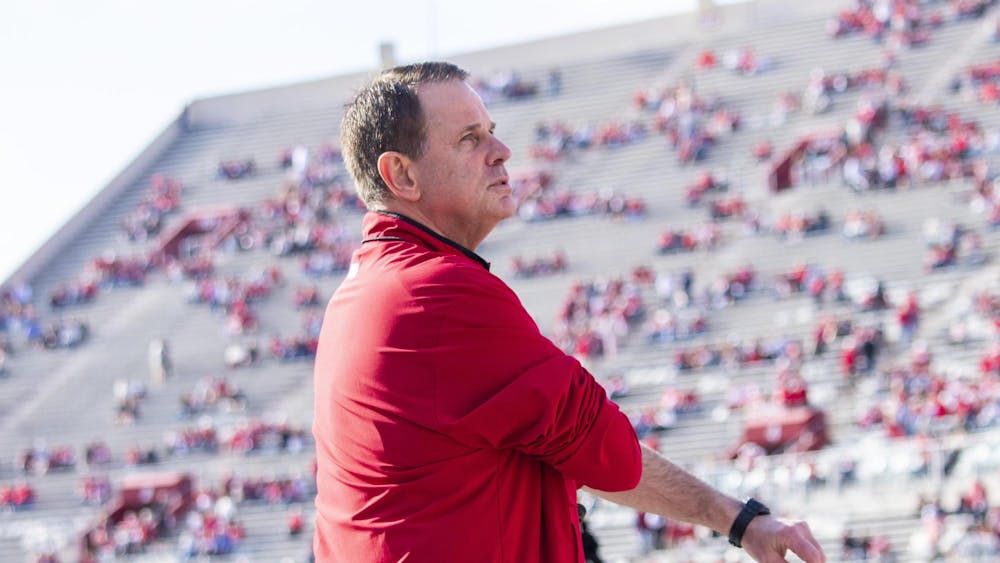Scott Wells' criminal trial concluded Wednesday, but the Monroe County councilman will have to wait until today for the verdict.\nThe prosecution and defense finished their closing arguments, and the jury elected to return this morning to deliberate rather than to stay late.\nThe charges against Wells include misdemeanor battery, operating while intoxicated, resisting law enforcement and disorderly conduct.\nThe Democratic councilman has insisted since he was arrested on Sept. 27, 2002, that he was set up by his political opponents and assaulted by state policemen Stacy Brown and Travis Coryea.\nAssistant special prosecutor Bob Andre began the prosecution's closing remarks by telling the jury the defense has unfairly characterized arresting officers Coryea and Brown.\n"Their motives are far from pure," Andre said of Brown and Coryea. "But troopers Brown and Coryea are their own men, and this trial is not about them; it's about whether the defendant broke the law."\nAndre admitted there was a political motive behind Wells' arrest, but encouraged jurors to focus on the law and not politics.\n"There is a place in our community for civic opportunity," Andre said. "But there is not a place on our roads for impaired drivers."\nAndre was Wells' assistant track and field coach at Owen Valley High School for one season. Wells said he knew Andre was trying to do his job, but couldn't help but take his arguments personally.\n"He is presenting lies as truth," Wells said. "I just can't believe the same guy I used to coach with is now trying to slit my throat."\nSpecial prosecutor Stan Levco presented his thoughts in conclusion to the state's case saying trooper Brown and Coryea didn't have an axe to grind with Wells, but were just doing their jobs.\n"The police acted in the proper way," Levco said. "The fact that they stopped him that night may have saved someone's life, most likely his."\nLevco said his entire case rested on the credibility of the two arresting officers.\n"If there had been the slightest bit of evidence connecting trooper Brown and Coryea of misrepresenting the arrest I wouldn't have tried the case," Levco said.\nHe questioned the credibility of the IU students who said they witnessed Wells' arrest and saw the councilman taken down in a violent and brutal way.\n"Who do you think these college kids are going to identify with? The police?" Levco said.\nThe defense team of Elizabeth Cure and David Colman used their final opportunity to remind jurors who has the burden of proof.\n"This trial has been filled with a lot of maybes and what-ifs and possibilities," Cure said. "We don't convict in this country on maybes, what-ifs and possibilities, in fact in those cases we acquit."\nCure gave jurors examples of testimony and evidence from the prosecution's case suggesting possible avenues of doubt. She brought up trooper Brown's report of spotting Wells driving his car, but waiting to pull him over.\n"The state police let him (Wells) drive in Indiana intoxicated?" Cure asked the jury. "If someone's intoxicated you don't wait to pull them over."\nAttorney Colman detailed each highlight of the defense's case. He insisted, "Scott Wells was framed," as he repeated it three times.\n"Red lights were flashing not just in the police car," Colman said. "But in Scott's mind because he knew what was happening wasn't right."\nColman suggested trooper Brown's original statement of seeing no impairment was contradictory to his final report of Wells staggering to his car and driving erratically. Brown testified he remembered thinking something about the arrest wasn't right, but took Wells out of his car anyway.\nA tape recorded conversation between Brown and police dispatcher James Valentine captures the moment the policemen realized they may have been exploited in the name of local politics.\n"It sounds like we all might have been used a little bit," Valentine told Brown.\n"I say there was a cover up but it was only partial," Colman said. "There are people out there who are embarrassed by this and those people need to be vindicated by this verdict. We cannot allow frame-ups and set-ups because then innocent people will be convicted."\nColman concluded his remarks by telling a story of the late former Bloomington mayor and U.S. congressman Frank McCloskey. McCloskey visited Wells' fund raiser to raise money for his trial. He spoke in front of the crowd and focused on Bloomington's political climate and Wells' criminal trial.\n"We can't let these sons of bitches get away with this," McCloskey told the crowd of Wells supporters.\nColman told the jury in order to convict his client they would have to agree with the people who propagated his set up.\n"For the sake of this community and Scott Wells you must not let these sons of bitches get away with this," Colman told the jury.\nThe trial will resume at 9 a.m. Thursday when the jury will begin deliberations and reach it's verdict.\n-- Contact senior writer Mitch Blacher at mblacher@indiana.edu.
Jury to deliver decision
Final verdict of county councilman's trial to come today
Get stories like this in your inbox
Subscribe





